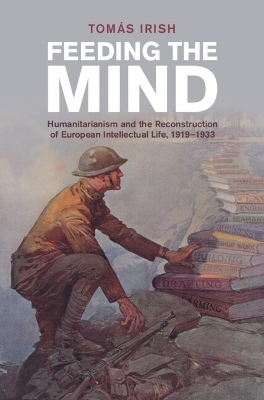
Feeding the Mind
Humanitarianism and the Reconstruction of European Intellectual Life, 1919–1933
Seiten
2023
Cambridge University Press (Verlag)
978-1-009-12322-8 (ISBN)
Cambridge University Press (Verlag)
978-1-009-12322-8 (ISBN)
In the aftermath of the cataclysm of the First World War, politicians, philanthropists and humanitarians directed aid to Europe's intellectuals and their shattered institutions to stabilise the continent's democracies and preserve international peace. This groundbreaking book tells the story of the postwar rebuilding of European intellectual life.
Feeding the Mind explores how European intellectual life was rebuilt after the cataclysm of the First World War. Learned communities were left in ruins by the conflict and its consequences; cultural and educational sites were destroyed, writers and artists were killed in battle, and tens of thousands of others were displaced. Against the backdrop of an unprecedented post-war humanitarian crisis which threatened millions with starvation and disease, many organisations chose to focus on assisting intellectuals and their institutions, giving them food, medicine and books in order to stabilise European democracies and build a peaceful international order. Drawing on examples from Austria to Russia and Belgium to Serbia, Feeding the Mind analyses the role of humanitarianism in post-conflict reconstruction and explores why ideas and intellectuals were deemed to be worth protecting at a time of widespread crisis. This issue was pertinent in the century that followed and remains so today.
Feeding the Mind explores how European intellectual life was rebuilt after the cataclysm of the First World War. Learned communities were left in ruins by the conflict and its consequences; cultural and educational sites were destroyed, writers and artists were killed in battle, and tens of thousands of others were displaced. Against the backdrop of an unprecedented post-war humanitarian crisis which threatened millions with starvation and disease, many organisations chose to focus on assisting intellectuals and their institutions, giving them food, medicine and books in order to stabilise European democracies and build a peaceful international order. Drawing on examples from Austria to Russia and Belgium to Serbia, Feeding the Mind analyses the role of humanitarianism in post-conflict reconstruction and explores why ideas and intellectuals were deemed to be worth protecting at a time of widespread crisis. This issue was pertinent in the century that followed and remains so today.
Tomás Irish is Associate Professor of Modern History at Swansea University. A specialist in the cultural history of the First World War and interwar Europe, his books include the prizewinning The University at War 1914-25: Britain, France and the United States (2015), and Trinity in War and Revolution, 1912-23 (2015).
Introduction; 1. 1919: rebuilding civilization; 2. Feeding bodies: food relief and 'the most deplorable victims of the war.'; 3. Feeding the mind: the post-war book crisis; 4. Knowledge displaced; 5. Books and buildings: the reconstruction of libraries after the first world war; 6. Who were the intellectuals?; Epilogue. Beyond 1933.
| Erscheinungsdatum | 18.10.2021 |
|---|---|
| Reihe/Serie | Studies in the Social and Cultural History of Modern Warfare |
| Zusatzinfo | Worked examples or Exercises |
| Verlagsort | Cambridge |
| Sprache | englisch |
| Themenwelt | Geisteswissenschaften ► Geschichte ► Regional- / Ländergeschichte |
| Sozialwissenschaften | |
| ISBN-10 | 1-009-12322-X / 100912322X |
| ISBN-13 | 978-1-009-12322-8 / 9781009123228 |
| Zustand | Neuware |
| Haben Sie eine Frage zum Produkt? |
Mehr entdecken
aus dem Bereich
aus dem Bereich
Erinnerungen
Buch | Softcover (2024)
Pantheon (Verlag)
16,00 €


